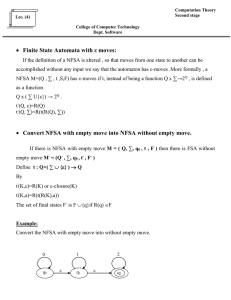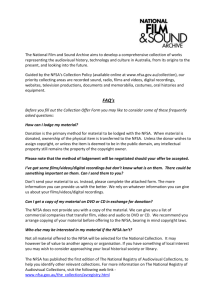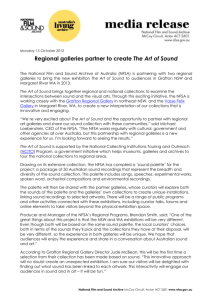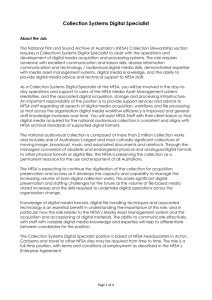Screening Loans – Theatrical Conditions
advertisement
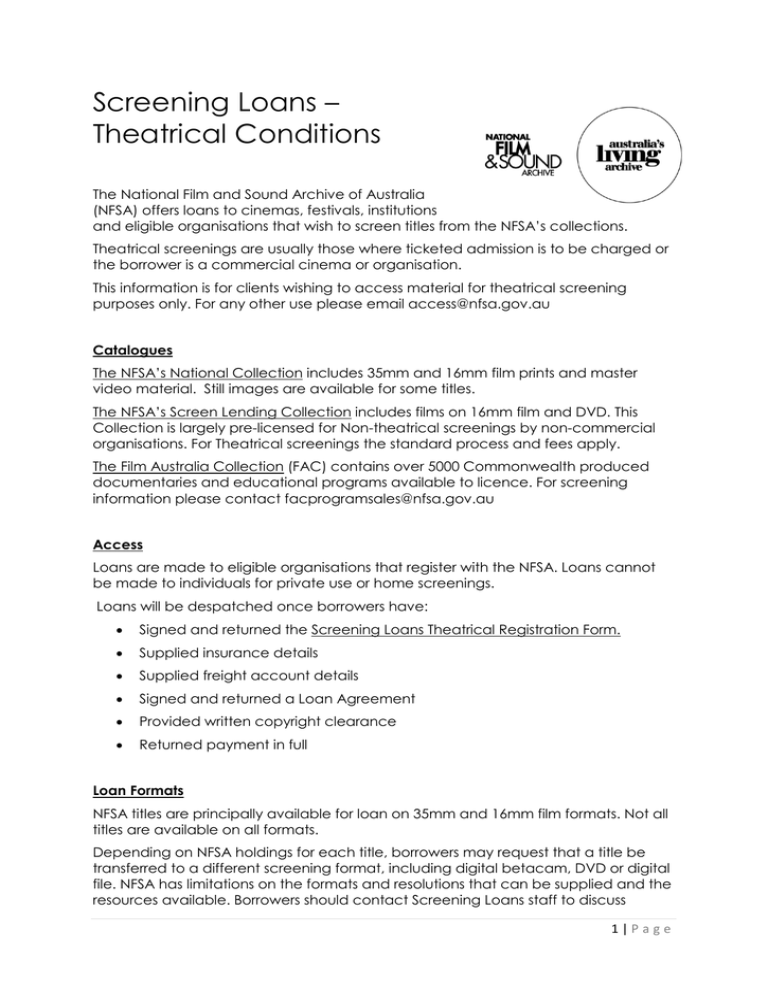
Screening Loans – Theatrical Conditions The National Film and Sound Archive of Australia (NFSA) offers loans to cinemas, festivals, institutions and eligible organisations that wish to screen titles from the NFSA’s collections. Theatrical screenings are usually those where ticketed admission is to be charged or the borrower is a commercial cinema or organisation. This information is for clients wishing to access material for theatrical screening purposes only. For any other use please email access@nfsa.gov.au Catalogues The NFSA’s National Collection includes 35mm and 16mm film prints and master video material. Still images are available for some titles. The NFSA’s Screen Lending Collection includes films on 16mm film and DVD. This Collection is largely pre-licensed for Non-theatrical screenings by non-commercial organisations. For Theatrical screenings the standard process and fees apply. The Film Australia Collection (FAC) contains over 5000 Commonwealth produced documentaries and educational programs available to licence. For screening information please contact facprogramsales@nfsa.gov.au Access Loans are made to eligible organisations that register with the NFSA. Loans cannot be made to individuals for private use or home screenings. Loans will be despatched once borrowers have: • Signed and returned the Screening Loans Theatrical Registration Form. • Supplied insurance details • Supplied freight account details • Signed and returned a Loan Agreement • Provided written copyright clearance • Returned payment in full Loan Formats NFSA titles are principally available for loan on 35mm and 16mm film formats. Not all titles are available on all formats. Depending on NFSA holdings for each title, borrowers may request that a title be transferred to a different screening format, including digital betacam, DVD or digital file. NFSA has limitations on the formats and resolutions that can be supplied and the resources available. Borrowers should contact Screening Loans staff to discuss 1|Page specific requirements. Research, Service and Transfer fees apply for all copying tasks. These are in addition to Loan fees. Items copied for screening in non-film formats, e.g. digital betacam, are considered to be loan items and must be returned to the NFSA, unless specifically agreed to by the rights holder and the NFSA. Registration and Eligibility The Screening Loans Theatrical Registration Form is to be completed by all borrowers wishing to loan and screen NFSA material. The NFSA reserves the right to refuse registration applications at its discretion. The specific projection and associated equipment used by the borrower, together with the qualifications and experience of projectionists, form part of the registration and approvals process. It is recommended that borrowers consult with the projectionist or venue manager when completing this section of the registration form, as applications that do not contain these technical details will not be considered. Material lent is subject to conditions of loan, projection conditions and print availability. The NFSA reserves the right to specify projection particulars or decline requests to loan items. The Registration process is a one-off requirement for new borrowers, however the NFSA reserves the right to request a new Registration Form be completed at any time in the future, particularly if more than five years have elapsed between loans. Borrowers are required to advise Screening Loans staff if personnel or equipment details change. Booking Booking requests should be made through Screening Loans staff by emailing screeningloans@nfsa.gov.au NFSA staff can provide general curatorial advice for borrower’s programs. Complex research and programming requests attract an hourly research fee. Please discuss research requirements with a staff member. Bookings should be made at least 4 weeks in advance of the required despatch date. The NFSA reserves the right not to accept bookings made at shorter notice. Urgent requests are subject to capacity and additional fees may apply. Requests requiring copying to other formats for loan may require additional lead time depending on the complexity of the request and the capacity of staff. Once all loan requirements are confirmed, Screening Loans staff will provide a quote for loans, copying and any other services. On acceptance of the quote, the NFSA will issue an invoice which must be paid before the requested titles will be despatched. The normal loan period allows for one screening only. NFSA titles must be returned promptly after screening. Multiple screenings and extended bookings will need to be negotiated at additional charge. The NFSA reserves the right to limit the number of film screenings. 2|Page Loan Fees The NFSA charges fees for cost-recovery and access to the NFSA collection. A service fee may apply at the commencement of a borrower’s loan request. Current fees are outlined on the NFSA website via the Screening Loans page: http://www.nfsa.gov.au/collection/screening-loans/ Fees are reviewed annually and are subject to change. The NFSA does not charge licensing fees for materials owned by third party rights holders. Permissions and licensing fees are negotiated directly between the borrower and the rights holder. Cancellations Bookings may be cancelled by notifying staff via email or telephone. In the event that a booking is to be cancelled before the required despatch date, cancellation charges of up to half the loan fee for the order will apply if film prints have already been prepared for despatch. Bookings cannot be cancelled once they are despatched. The full loan fee for the order will apply and the borrower will still be responsible for the cost of freight. Archival Projection Certain 35mm film prints in the NFSA collection are designated ‘Archival’ category prints. These must be projected using a dual projector system with change-overs for each 2000’ reel. Archival prints must not be ‘built up’ or spliced together onto larger reels, nor screened on single projector ’platter’ systems. Only NFSA ‘Access’ category prints may be screened using single projector ’platter’ systems. Print Condition NFSA film prints are part of an access collection and print condition can vary significantly. The NFSA will supply the borrower with all known film print condition information from our database at no charge, noting that some prints have no recorded condition report. Where this information is not available, or comparison of prints is necessary, borrowers may request an advance condition assessment. Indicative spot checks include a brief examination of one reel of the film to ascertain indicative conditions such as colour fade and scratches etc. Full checks include a detailed examination of all reels with written report. Additional fees apply for indicative and full print condition reports. Loan Agreement All loans of titles for Theatrical screenings will be made under a separate Loan Agreement for each loan or event, which is in addition to the one‐off Registration Form. The Loan Agreement serves as a legal contract between the borrower and the NFSA. The responsibilities of the borrower are detailed on the Loan agreement. 3|Page The Loan Agreement must be signed by the borrower and returned to the NFSA before materials will be despatched. Copyright The NFSA adheres strictly to all copyright laws, and requires borrowers to do likewise. All public film screenings require copyright clearance. The NFSA is not the distributor, licensor or rights holder of the vast majority of NFSAheld film titles. The NFSA only makes films available for loan and screening where copyright permission has been obtained by the borrower from the appropriate rights holder for the specific use. The NFSA will provide the borrower with the last known contact details for the rights holder, noting that rights holders and distributors can change over time. It is the borrower’s responsibility to locate the appropriate rights holder/s and seek clearance. The clearance from the rights holder must specify the film titles, screening format, admission charge, venue and date of the screenings. Permission must also be specifically granted for copies to be made onto alternative screening formats or for images to be supplied. Unless additional written consent by a copyright holder is provided to the NFSA, it is an offence for borrowers to: • Use NFSA titles for any commercial purpose, other than specified in the clearance; • Transmit or communicate NFSA titles by electronic or digital means, such as television, closed circuit, cable, on‐line or any other electronic means of any kind, present or future; • Save, copy or reproduce NFSA titles as a whole or in part, by any format or storage method whatsoever; and • Lend NFSA titles to any other person or organisation. The Borrower will forward through written permission/s from the copyright owner/s to Screening Loans staff at least four weeks prior to the Screening date/s. NFSA will not despatch the Material until copyright permission is received. Indigenous Cultural and Intellectual Property (ICIP) Guidelines The NFSA respects Indigenous culture, Indigenous Individuals and Indigenous communities and recognises their ownership of cultural and intellectual property rights. Footage of Aboriginal and Torres Strait Islander peoples accessed from the NFSA’s National Collection, the Screen Lending Collection and the Film Australia Collection (FAC) are subject to the terms and conditions of our Indigenous Cultural and Intellectual Property (ICIP) Guidelines. 4|Page If Indigenous community clearance is required, the NFSA will provide the borrower with the last known contact details for the Indigenous owners. It is the borrower’s responsibility to seek clearance. A warning is to be included when footage is screened to the public as follows: “Warning: Aboriginal and Torres Strait Islander viewers are advised that the following program may contain images and/or audio of deceased persons”. Audience numbers The NFSA requires all borrowers to report attendance within two weeks of the screening. The NFSA uses this information to assess its service and be more responsive to borrowers' needs. Freight Borrowers are responsible for arranging freight in both directions at their expense and on their own freight account. The NFSA will book outwards shipping using the borrower’s account. In limited circumstances, the NFSA may agree to consign freight on its own freight account within Australia for additional charge. Borrowers are required to arrange all freight shipments of NFSA films via a recognised commercial courier. Freight should be traceable. Returns It is the responsibility of the borrower to ensure the safe return of items on time to the NFSA. The films must arrive back at the NFSA no later than two weeks after the screening. The NFSA reserves the right to charge a weekly overdue loan fee. Film prints should be tight wound and flat. Titles should be returned securely packaged using original boxes and packaging material. The Borrower agrees to delete or destroy all files, versions and copies of NFSA Material/s from projection systems and other storage media within one week of the final screening. Insurance and Damage Borrowers are responsible for collection material for the duration of the loan period. This includes during outward and return transit. It is required that borrowers hold insurance to cover loss or damage to NFSA collection material in their care. Borrowers are required to ensure their insurance covers loss or damage to materials in transit. Borrowers agree to supply the NFSA with a Certificate of Insurance upon request, or otherwise demonstrate that appropriate insurance cover is held. Borrowers with third party venue hire arrangements (i.e. cinemas or screening venues) should ensure that their arrangements cover loss and damage of film prints at the venue. 5|Page Should damage to NFSA titles occur, borrowers must not attempt repair. Please include an explanation of the nature and cause of the damage on the screening report and return this to Screening Loans staff. Borrowers may be required to pay for the repair or replacement of a collection item in any instance where the item is lost or damaged. Upon return of the damaged item, the NFSA will determine whether the item needs to be replaced or repaired, and the appropriate cost to the borrower. If an item arrives in a damaged state, the borrower must inform the NFSA prior to screening, otherwise the NFSA will determine the damage was caused by the borrower. For more information, refer to the Information for NFSA Screening Loans Borrowers: Loan Damage and Insurance. NFSA Acknowledgement and Advertising It is a condition of all loans that the NFSA be acknowledged as the source of the film. Any publicity, advertising or screening notes, whether printed or in online or electronic form, should acknowledge each title loaned from the NFSA with the following credit: ‘Courtesy of the National Film and Sound Archive of Australia'. The NFSA prefers acknowledgement to be accompanied by the NFSA logo wherever possible. Screening Loans staff can provide borrowers with a digital copy of the logo. Film and video copies created by the NFSA contain a leader with the NFSA logo and the following attribution; ‘From the collection of the National Film and Sound Archive of Australia’. This leader, and any additional sponsor or collection acknowledgements are to be screened preceding the film, and must not be removed. Acknowledgements are specified in the Loan Agreement and borrowers are contractually obliged to acknowledge the NFSA as a condition of the loan. Failure to acknowledge or credit the NFSA will result in an additional fee. Failure to adhere to these terms and conditions will prohibit borrowers from loaning NFSA collection material. Contact us Email: screeningloans@nfsa.gov.au Tel: (02) 6248 2204 6|Page
